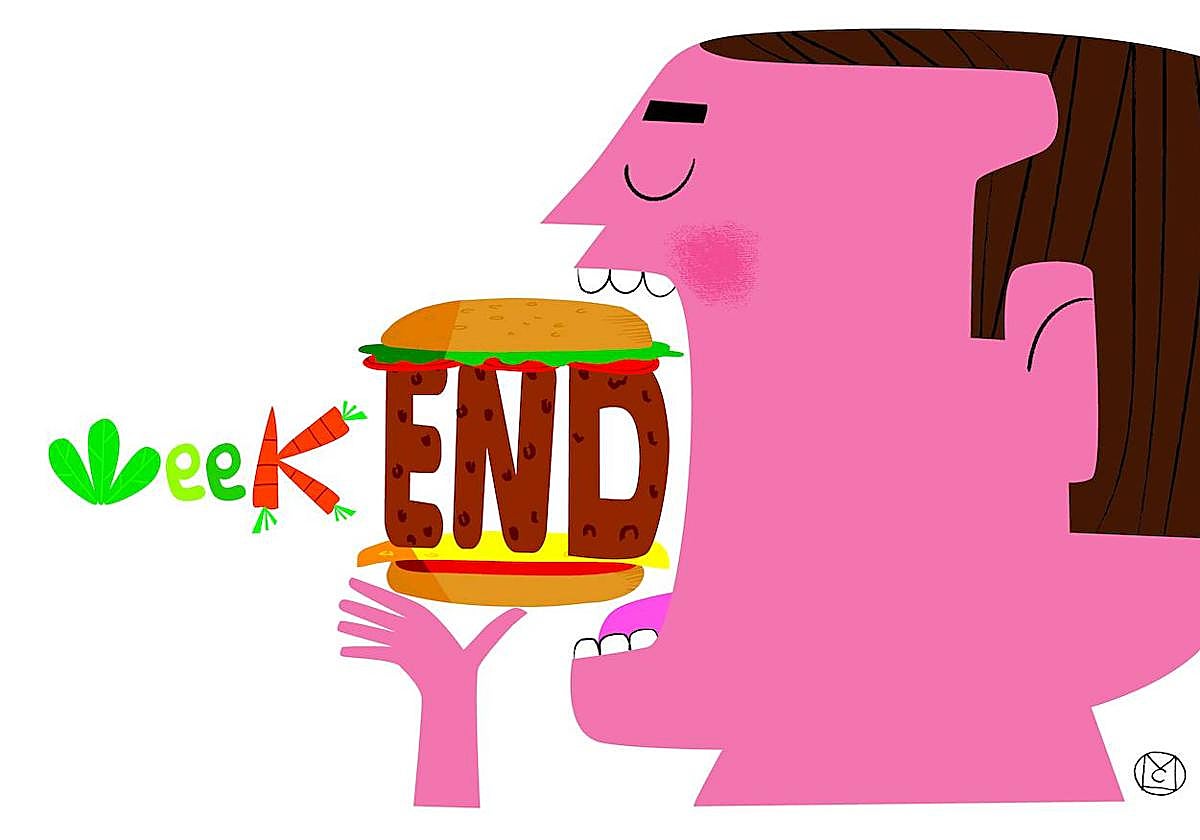Can we skip the diet at weekends?
We shouldn't but if we do, it shouldn't be more than one or two meals
Solange Vásquez
Viernes, 24 de marzo 2023, 12:28
It is an old story, heard 1,000 times: "I'm on a diet and eating the right things, but I'm not losing weight". And people say it as if something strange is going on, some mystery with no explanation. "If only I had a euro for every time someone has said that to me....!" says Ismael Galancho, who is a specialist in nutritional planning.
The explanation is usually simple. There is nothing mysterious about it. "Often, at the weekend, people lose the benefit of all the effort they have made during the week," he says. In other words, people stick to their diet from Monday to Friday but cheat and eat what they like at weekends.
Galancho explains the problem through numbers. "If we want to lose a kilo a week, we need to consume about 3,500 fewer calories during that time. So we need to cut down by 500 calories a day," he says. But if when the weekend arrives we indulge ourselves, our calorie count will be higher and we will get fatter, or at the very least we won't lose any more weight. And on Monday, it all starts again.
So does this mean that a diet won't work if we don't stick to it rigidly? No, says Galancho. "Flexibility is the answer. If you try to eat nothing but grilled chicken, broccoli and yoghurt, you are bound to fail," he explains.
But if we want to get thinner (and according to the European Health Survey for Spain, 16 per cent of the population suffer from obesity), watching what we eat for five days and eating too much on two days a week is not viable.
"You need to use your common sense," Galancho says. The million-dollar question, of course, is how many cheat meals we can have in a week?
"As a general rule, one or two at the absolute maximum. No more. That is more or less what the body can accept without changing," he says.
When that blast of calories arrives in the body it adapts by producing more insulin and, under normal conditions, apart from bloating, there will be no further consequences.
"The body isn't that sensitive," Ismael Galancho says. Nevertheless, this is not a pattern that can be adopted as part of a routine. If we continue doing it for years, "there will come a point when the consequences will show up in our blood tests," he says, because over time the body loses the ability to adapt.
The weekly cheat meal - which originated in the fitness world some years ago and has become very popular - has its detractors, who believe that waiting for this 'permission' generates anxiety, and defenders, who believe it is an incentive to resist temptations during the week.
Galancho does not recommend following this system of restrictions and rewards, and says that when someone wants to lose weight "not everything is black and white. You have to work with greys, because moderation is better than extremes". However, for those who do want to cheat from time to time, he has these tips.
1. Control your lack of control
If you're going to indulge, plan in advance.
"Deciding that instead of having five beers, you will have three, for example, will prepare you mentally and help you not to overdo it," Galancho says. This scientific evidence is backed up by many scientific studies. One of the most recent, published by the Journal of Consumer Psychology, showed that people who are making efforts to achieve objectives such as losing weight or saving money, which require a prolonged suppression of desires, benefit if small pleasures or treats are included in the process.
2. Danger: 'empty' stomach
To avoid the temptation to overeat, have something before the cheat meal: a piece of fruit or a glass of natural juice for example. It's not a good idea to be hungry when the time comes for the cheat meal.
3. Refine it a bit
So you're going to cheat a bit, OK, but there's no need to go crazy and stuff yourself with all the wrong things. "A burger from a fast-food joint is not as good for you as some grilled meat, a plate of chips on the side is not the same as a nice salad, and it's better to have three slices of pizza rather than eat a whole one," Ismael Galancho says.
Risk of eating disorders?
Nutritionist Beatriz Robles believes there are risks involved with the cheat meal, or cheat day, system. "It's best to follow healthy eating patterns that we can maintain over time," she says. And she warns against the restrictions being so hard that we rebel against them, "although slipping once in a while doesn't matter," she says. The danger, Robles warns, is that people could develop eating disorders because this practice, carried to the extreme, can lead to a lack of control, restriction, excessive eating and excessive concern about the body. "People with a predisposition to suffering from eating disorders could have problems with this type of routine," she says.



